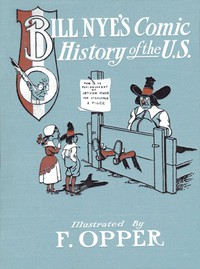A Book of Burlesques by H. L. Mencken (ebook reader color screen .txt) 📗

- Author: H. L. Mencken
Book online «A Book of Burlesques by H. L. Mencken (ebook reader color screen .txt) 📗». Author H. L. Mencken
[128]
The First Man
And yet Paris is famous all over the world. No American ever came to Europe without dropping off there to have a look. I once saw the Bal Tabarin crowded with Sunday-school superintendents returning from Jerusalem. And when the sucker gets home he goes around winking and hinting, and so the fake grows. I often think the government ought to take a hand. If the beer is inspected and guaranteed in Germany, why shouldn’t the shows be inspected and guaranteed in Paris?
The Second Man
I guess the trouble is that the Frenchmen themselves never go to their own shows. They don’t know what is going on. They see thousands of Americans starting out every night from the Place de l’Opéra and coming back in the morning all boozed up, and so they assume that everything is up to the mark. You’ll find the same thing in Washington. No Washingtonian has ever been up to the top of the Washington monument. Once the elevator in the monument was out of commission for two weeks, and yet Washington knew nothing about it. When the news got into the papers at last, [129]it came from Macon, Georgia. Some honeymooner from down there had written home about it, roasting the government.
The First Man
Well, me for the good old U. S. A.! These Alps are all right, I guess—but I can’t say I like the coffee.
The Second Man
And it takes too long to get a letter from Jersey City.
The First Man
Yes, that reminds me. Just before I started up here this afternoon my wife got the Ladies’ Home Journal of the month before last. It had been following us around for six weeks, from London to Paris, to Berlin, to Munich, to Vienna, to a dozen other places. Now she’s fixed for the night. She won’t let up until she’s read every word—the advertisements first. And she’ll spend all day to-morrow sending off for things; new collar hooks, breakfast foods, complexion soaps and all that sort of junk. Are you married yourself?
[130]
The Second Man
No; not yet.
The First Man
Well, then, you don’t know how it is. But I guess you play poker.
The Second Man
Oh, to be sure.
The First Man
Well, let’s go down into the town and hunt up some quiet barroom and have a civilised evening. This scenery gives me the creeps.
The Second Man
I’m with you. But where are we going to get any chips?
The First Man
Don’t worry. I carry a set with me. I made my wife put it in the bottom of my trunk, along with a bottle of real whiskey and a couple of porous plasters. A man can’t be too careful when he’s away from home——
[131]
They start along the terrace toward the station of the funicular railway. The sun has now disappeared behind the great barrier of ice and the colours of the scene are fast softening. All the scarlets and vermilions are gone; a luminous pink bathes the whole picture in its fairy light. The night train for Venice, leaving the town, appears as a long string of blinking lights. A chill breeze comes from the Alpine vastness to westward. The deep silence of an Alpine night settles down. The two Americans continue their talk until they are out of hearing. The breeze interrupts and obfuscates their words, but now and then half a sentence comes clearly.
The Second Man
Have you seen any American papers lately?
The First Man
Nothing But the Paris Herald—if you call that a paper.
The Second Man
How are the Giants making out?
The First Man
... bad as usual ... rotten ... shake up ...
[132]
The Second Man
... John McGraw ...
The First Man
... homesick ... give five dollars for ...
The Second Man
... whole continent without a single ...
The First Man
... glad to get back ... damn tired ...
The Second Man.
... damn ...!
The First Man.
... damn ...!
[133]
VII.—FROM THE MEMOIRS OF THE DEVILVII.—From the Memoirs of the Devil
[135]
January 6.
And yet, and yet—is not all this contumely a part of my punishment? To be reviled by the righteous as the author of all evil; worse still, to be venerated by the wicked as the accomplice, nay, the instigator, of their sins! A harsh, hard fate! But should I not rejoice that I have been vouchsafed the strength to bear it, that the ultimate mercy is mine? Should I not be full of calm, deep delight that I am blessed with the resignation of the Psalmist (II Samuel XV, 26), the sublime grace of the pious Hezekiah (II Kings XX, 19)? If Hezekiah could bear the cruel visitation of his erring upon his sons, why should I, poor worm that I am, repine?
January 8.
All afternoon I watched the damned filing in. With what horror that spectacle must fill [136]every right-thinking man! Sometimes I think that the worst of all penalties of sin is this: that the sinful actually seem to be glad of their sins (Psalms X, 4). I looked long and earnestly into that endless procession of faces. In not one of them did I see any sign of sorrow or repentance. They marched in defiantly, almost proudly. Ever and anon I heard a snicker, sometimes a downright laugh: there was a coarse buffoonery in the ranks. I turned aside at last, unable to bear it longer. Here they will learn what their laughter is worth! (Eccl. II, 2.)
Among them I marked a female, young and fair. How true the words of Solomon: “Favour is deceitful, and beauty is vain!” (Proverbs XXXI, 30.) I could not bring myself to put down upon these pages the whole record of that wicked creature’s shameless life. Truly it has been said that “the lips of a strange woman drop as a honeycomb, and her mouth is smoother than oil.” (Proverbs V, 3.) One hears of such careers of evil-doing and can scarcely credit them. Can it be that the children of men are so deaf to all the warnings given them, so blind to the vast certainty of their punishment, so ardent in seeking temptation, so lacking in holy fire to resist it? Such thoughts [137]fill me with the utmost distress. Is not the command to a moral life plain enough? Are we not told to “live soberly, righteously, and godly?” (Titus II, 11.) Are we not solemnly warned to avoid the invitation of evil? (Proverbs I, 10.)
January 9.
I have had that strange woman before me and heard her miserable story. It is as I thought. The child of a poor but pious mother, (a widow with six children), she had every advantage of a virtuous, consecrated home. The mother, earning $6 a week, gave 25 cents of it to foreign missions. The daughter, at the tender age of 4, was already a regular attendant at Sabbath-school. The good people of the church took a Christian interest in the family, and one of them, a gentleman of considerable wealth, and an earnest, diligent worker for righteousness, made it his special care to befriend the girl. He took her into his office, treating her almost as one of his own daughters. She served him in the capacity of stenographer, receiving therefor the wage of $7.00 a week, a godsend to that lowly household. How truly, indeed, it has been said: “Verily, there is a [138]reward for the righteous.” (Psalms LVIII, 11.)
And now behold how powerful are the snares of evil. (Genesis VI, 12.) There was that devout and saintly man, ripe in good works, a deacon and pillar in the church, a steadfast friend to the needy and erring, a stalwart supporter of his pastor in all forward-looking enterprises, a tower of strength for righteousness in his community, the father of four daughters. And there was that shameless creature, that evil woman, that sinister temptress. With the noisome details I do not concern myself. Suffice it to say that the vile arts of the hussy prevailed over that noble and upright man—that she enticed him, by adroit appeals to his sympathy, into taking her upon automobile rides, into dining with her clandestinely in the private rooms of dubious hotels, and finally into accompanying her upon a despicable, adulterous visit to Atlantic City. And then, seeking to throw upon him the blame for what she chose to call her “wrong,” she held him up to public disgrace and worked her own inexorable damnation by taking her miserable life. Well hath the Preacher warned us against the woman whose “heart is snares and nets, and her hands as bands.” (Eccl. VII, 26.) Well do we [139]know the wreck and ruin that such agents of destruction can work upon the innocent and trusting. (Revelations XXI, 8; I Corinthians VI, 18; Job XXXI, 12; Hosea IV, 11: Proverbs VI, 26.)
January 11.
We have resumed our evening services—an hour of quiet communion in the failing light. The attendance, alas, is not as gratifying as it might be, but the brethren who gather are filled with holy zeal. It is inspiring to hear their eloquent confessions of guilt and wrongdoing, their trembling protestations of contrition. Several of them are of long experience and considerable proficiency in public speaking. One was formerly a major in the Salvation Army. Another spent twenty years in the Dunkard ministry, finally retiring to devote himself to lecturing on the New Thought. A third was a Y. M. C. A. secretary in Iowa. A fourth was the first man to lift his voice for sex hygiene west of the Mississippi river.
All these men eventually succumbed to temptation, and hence they are here, but I think that no one who has ever glimpsed their secret and inmost souls (as I have during our hours of humble heart-searching together) will fail [140]to testify to their inherent purity of character. After all, it is not what we do but what we have in our hearts that reveals our true worth. (Joshua XXIV, 14.) As David so beautifully puts it, it is “the imagination of the thoughts.” (I Chronicles XXIII, 9.) I love and trust these brethren. They are true and earnest Christians. They loathe the temptation to which they succumbed, and deplore the weakness that made them yield. How the memory at once turns to that lovely passage in the Book of Job: “Wherefore I abhor myself, and repent in dust and ashes.” Where is there a more exquisite thought in all Holy Writ?
January 14.
I have had that scarlet woman before me, and invited her to join us in our inspiring evening gatherings. For reply she mocked me. Thus Paul was mocked by the Athenians. Thus the children of Bethel mocked Elisha the Prophet (II Kings II, 23). Thus the sinful show their contempt, not only for righteousness itself, but also for its humblest agents and advocates. Nevertheless, I held my temper before her. I indulged in no vain and worldly recriminations. When she launched into her [141]profane and disgraceful tirade against that good and faithful brother, her benefactor and victim, I held my peace. When she accused him of foully destroying her, I returned her no harsh words. Instead, I merely read aloud to her those inspiring words from Revelation XIV, 10: “And the evil-doer shall be tormented with fire and brimstone in the presence of the holy angels.” And then I smiled upon her and bade her begone. Who am I, that I should hold myself above the most miserable of sinners?
January 18.
Again that immoral woman. I had sent her a few Presbyterian tracts: “The Way to Redemption,” “The Story of a Missionary in Polynesia,” “The White Slave,”—inspiring and consecrated writings, all of them—comforting to me in many a bitter hour. When she came in I thought it was to ask me to pray with her. (II Chronicles VII, 14.) But her heart, it appears, is still shut to the words of salvation. She renewed her unseemly denunciation of her benefactor, and sought to overcome me with her weeping. I found myself strangely drawn toward her—almost pitying her. She approached me, her eyes suffused with tears, her red lips parted, her hair flowing about her [142]shoulders. I felt myself drawn to her. I knew and understood the temptation of





Comments (0)